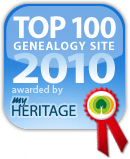Matthew Bielawa’s third lecture on Saturday was about Polish repatriation and resettlement after World War II.
As World War Ii drew to an end, the Allies met to redraw the map of Europe. The United States, USSR, and United Kingdom held three historic meetings at Tehran, Yalta, and Potsdam.
In the end, Poland’s borders moved 200 km west. Poland lost 178,000 sq km to the USSR in the east, but gained 101,000 sq km from Germany in the west.
As a result of these changes in Poland’s borders, there was a massive population exchange. Ethnic Poles in the Ukraine moved west. Ethnic Germans in Poland, moved west. Ethnic Ukrainians, Belarusians, and Lithuanians outside the USSR moved east.
In effect, these movements amounted to government sanctioned ethnic cleansing.
Understanding these movements helps explain why Polish relatives no longer live where they did before World War II, helps one locate records regarding resettlement, find relatives who moved to different regions of Poland, and understand how relatives born in Lviv died hundreds of kilometers to the west.
After World War II, Poles fled westward for many reasons including fear of the Soviets (remembering the events in 1939) and fear of Ukrainian nationalists “Banderowcy”. Many people thought the relocation was temporary. It was not. Theoretically, those relocated did so voluntarily and were compensated.
Relocation involved a difficult journey on crowded trains with lack of food, freezing temperatures in winter, and massive delays.
On occasion, those being relocated were stuck in train stations as they waited for the Germans to leave the war-damaged houses that were to become the new homes of the displaced.
Challenges to the genealogist include finding the location to which people were relocated, dealing with many different archives across national borders, and dealing with changing names of villages as Polish villages became Ukrainian and German villages became Polish.
The Polish government created the agency Państwowy Urząd Repatriacyjny” or PUR, to oversee the resettlement after World War II. Documents created by this agency include:
- Registration lists of repatriates and resettlers
- Village and town records of repatriates and resettlers
- letters concerning individuals
- memos regarding the living situations, transportation, and conditions of the people
The collection of papers assembled by PUR is found all over Poland, mostly in the State Archives closest to the location with which the documents are concerned. Unfortunately, the documents in the PUR collection are sorted by county (Powiat) and not by the names of the people mentioned in the documents.
Copyright © 2007 by Stephen J. Danko



